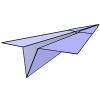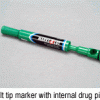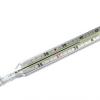Search Results
Showing results 101 to 120 of 133

Paper Airplane Contest
Source Institutions
In this fun physics activity (page 9 of the pdf), learners take part in a paper airplane design challenge.

Wrap It Up!
Source Institutions
In this Energy and Environment activity (page 9 of the PDF), learners calculate the mass of a piece of gum, compare it to the mass of the gum's packaging, and then create a bar graph of the results.

Glow in the Dark Jello
Source Institutions
In this activity, learners will make homemade jello that glows under a blacklight. They will learn about quinine, an ingredient in tonic water that is fluorescent.

Falling Faster
Source Institutions
In this activity about gravity (page 6 of the PDF), learners will come to understand how all objects will fall at the same rate, but that air will slow things down.

What's the Buzz
Source Institutions
In this physics activity, learners explore how sound is created by vibrations.

Chromatography
Source Institutions
In this activity (page 3 of the PDF), learners will observe a physical change.

Push: Water Ski Over the Sharks
Source Institutions
This is an online activity about acceleration. Learners will choose a speed and an angle in order to help a water-skier named Fonzie use a ramp to clear a shark.

Big Wave
Source Institutions
This is an activity about waves. Using marbles, paper clips and rubber bands, learners explore how waves behave.

A Swell Activity with Beans
Source Institutions
In this combination chemistry and physics activity, learners explore water absorption in dried beans or peas and learn how this affects their physical properties.

Plaster of Paris
Source Institutions
In this activity (page 6 of the PDF), learners will observe both a chemical and a physical change.

Tumble Wing Walkalong Glider
Source Institutions
In this physics activity (page 2 of the PDF), learners will construct their own walkalong glider. They will explore how air, though invisible, surrounds and affects other objects.

Density Stacker
Source Institutions
In this physics activity (page 8 of the PDF), learners will explore the property of density.

Checking For Starch
Source Institutions
In this chemistry activity (page 3 of the PDF), learners will observe a chemical change, specifically what happens to iodine when it is applied to ripe and unripe apples.

Solar Powered Cooking
Source Institutions
In this activity, learners make a solar oven. Learners witness the awesome power of the sun to make a yummy treat--a chocolate chip cookie!

Rubberband Rockets
Source Institutions
This fun and simple activity is a rubberband rocket design challenge! Learners will explore how tail fins can help to stabilize a flying object, while also exploring potential and kinetic energy.

Drag: Parachute from the Stratosphere
Source Institutions
This is an online game recreating the longest ever (at that point in time) freefall jump by Air Force Captain Joe Kittinger.

Take Me to the (Magnet) Races
Source Institutions
In this activity about magnetism (page 11 of the pdf), learners will experiment with magnets to explore how opposite poles attract and similar poles repel in magnetism.

Snake
Source Institutions
In this physics activity (page 4 of the PDF), learners will construct their own spiral "snake" and use it to explore the relationship between heat and kinetic energy.
Coat Hanger Chimes
Source Institutions
In this physics activity (page 4 of the PDF), learners will--using nothing more than a coat hanger and some string--explore and understand sound energy and how it moves.

Cabbage Chemistry
Source Institutions
In this chemistry activity (page 5 of the PDF), learners make an acid-base indicator using cabbage. Learners then explore how various subtances react with this indicator.
